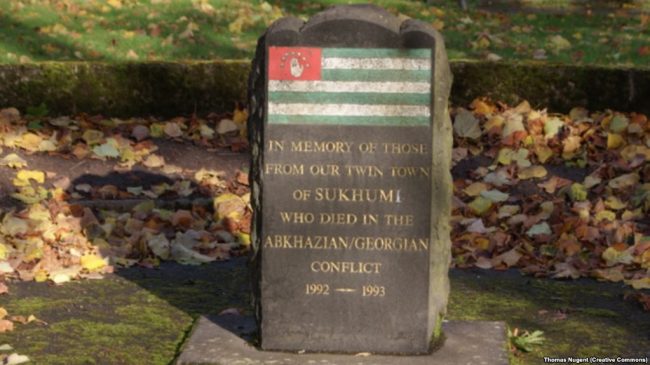


 A recently-removed memorial to victims of the Georgia–Abkhazia war in the Scottish town of Kilmarnock will be reinstalled unchanged, local authorities in Scotland have told OC Media. They say the memorial will remain this way until ‘a universally acceptable alternative wording and content’ can be agreed by all sides.
A recently-removed memorial to victims of the Georgia–Abkhazia war in the Scottish town of Kilmarnock will be reinstalled unchanged, local authorities in Scotland have told OC Media. They say the memorial will remain this way until ‘a universally acceptable alternative wording and content’ can be agreed by all sides.
The memorial, with the inscription ‘in memory of those from our twin town of Sukhumi who died in the Abkhazian/Georgian conflict 1992–1993’, also bearing an Abkhazian flag, was removed earlier in November. This was announced by Tamar Beruchashvili, Georgian Ambassador to the United Kingdom, on 9 November, who said they had been in month-long negotiations with British authorities.
[Read on OC Media: Removal of Abkhazian memorial in Scotland sparks controversy]
In a statement to OC Media on 29 November, East Ayrshire Council, of which Kilmarnock is a part, claimed they intend to ‘restore the memorial to its original location, without any changes being made at this time’.
The council also said they invite all parties who are ‘minded to assist to engage in a meaningful dialogue with the aim of establishing a universally acceptable alternative wording and content’, and claimed Council will then be ‘pleased’ to put in place.
OC Media has reached out to the Georgian Ministry for Reconciliation and Civic Equality and Ministries of Foreign Affairs and the Abkhazian Ministry of Foreign Affairs for comment.
Deputy Foreign Minister of Georgia Davit Dondua previously said the memorial would only be returned ‘after [it] is corrected’.
On 18 November, Ketevan Tsikhelashvili, Georgia’s State Minister for Reconciliation stated it must be reinstalled with a wording which ‘expresses the common pain and is acceptable for all sides which have suffered pain’.
After Georgian and Scottish authorities announced that the memorial would be reinstalled, Abkhazian Deputy Foreign Minister Kan Taniya wrote on Twitter that they are ‘categorically against making any changes to the memorial, which will be tantamount to its demolition’.
Removal of the memorial
According to the Council, permanent removal of the memorial was ‘never likely to be the preferred outcome’ explaining that in ‘order to cover all the possible outcomes, a request was made to have the memorial assessed by a professional stonemason’.
However, it was the Council’s contractor, ‘unaware of the political context to this operational request’, which followed their normal operating procedure and removed the memorial to a stonemason’s yard on a temporary basis to allow the assessment.
East Ayrshire council apologised for ‘having unwittingly set off the subsequent chain of events which followed’.
The Council said there had been no ‘prior incident or controversy’ about the memorial for the last 25 years, until now.
The council condemned the politicisation of such memorials, insisting it was dedicated ‘not [to] those who fell fighting for, or by the hand of, one side or the other, but simply all of those from Sukhumi whose lives were lost’, adding that ‘this was intended as a meaningful gesture of support and concern from one civic authority to another, recognising the twin town relationship which was in place at that time’.
Backlash in Abkhazia
The removal sparked outrage in Abkhazia, with many taking to Facebook with the hashtag #SaveAbkhazMemorial and Deputy Foreign Minister Kan Taniya launching an online petition against the removal.
On 19 November, a number of international writers and experts on the caucasus released a joint statement criticising the decision to remove the memorial, and urging all sides to ‘respect the war dead, find constructive ways to address the legacies of the past, and work towards lasting peace in the region’.
The list of 13 signatories included writer on the Caucasus Thomas de Waal, as well as experts from London-based peacebuilding groups Conciliation Resources and International Alert, both of which work in Abkhazia.
‘War memorials are of great significance: they remind us of the terrible cost of war and demand of us every effort to avoid violence in the future. Whilst the legacy of wars is inherently political, politicising war memorials does nothing to address the causes of violent conflict or to further the cause of reconciliation’, the statement read, pointing out that ‘fragile trust is easily broken’.
The experts called upon all concerned to ‘reinstate it so that dialogue can then take place to find mutually-acceptable and appropriate ways to respect the memory of all victims of the violence of the early 1990s’.
For ease of reading, we choose not to use qualifiers such as ‘de facto’, ‘unrecognised’, or ‘partially recognised’ when discussing institutions or political positions within Abkhazia, Nagorno-Karabakh, and South Ossetia. This does not imply a position on their status.






